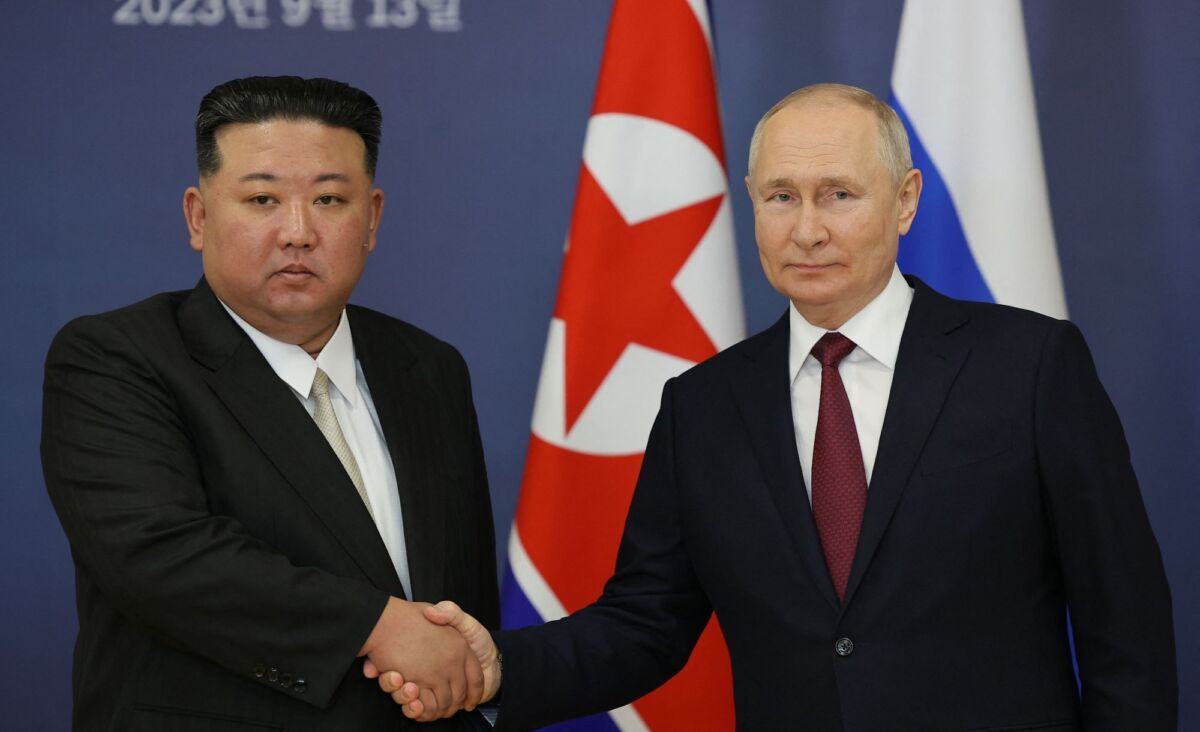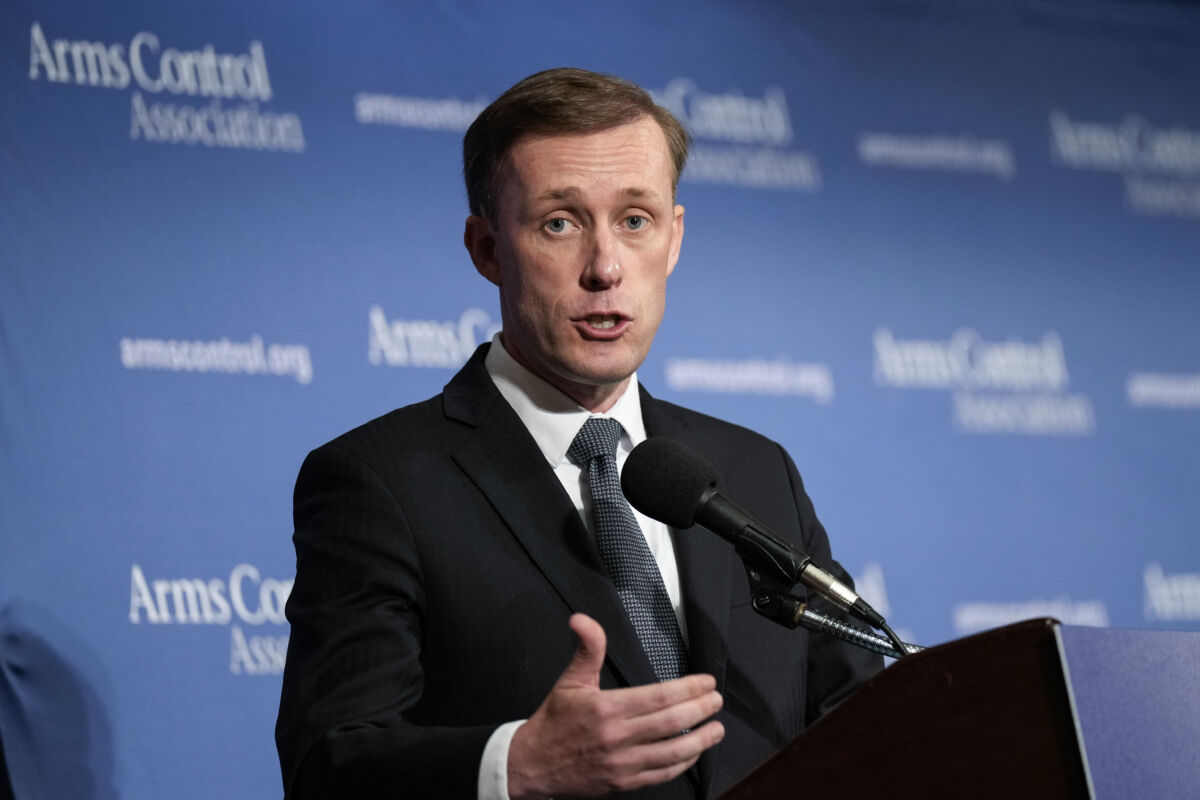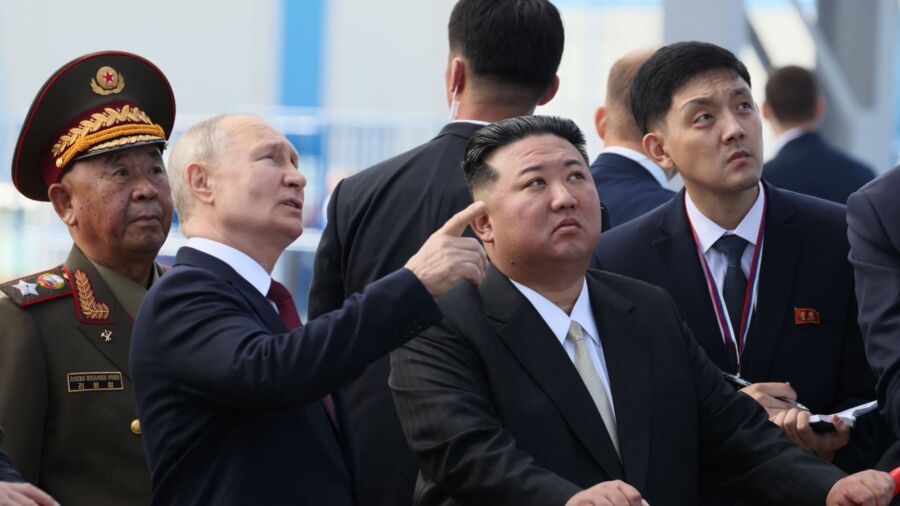Following a landmark meeting between the leaders of Russia and North Korea, Washington has voiced concern over what appear to be warming ties—especially in the military field—between Moscow and Pyongyang.
“We haven’t seen the full manifestation of this meeting yet,” U.S. State Dept. spokesman Matthew Miller said at a Sept. 13 press briefing.
“But when you see Kim Jong Un vowing to provide full, unconditional support for Russia’s so-called ‘sacred fight’ to defend its security interests … that is troubling,” he added.
Earlier the same day, Russian President Vladimir Putin met with North Korean leader Kim Jong Un in Russia’s far eastern Amur region.
Both men were accompanied by large delegations, including their ministers of defense and foreign affairs and other top officials.
The meeting, which reportedly lasted five hours, was characterized by public expressions of friendship by both sides.
Relations with Russia, Mr. Kim said, constituted his country’s “main priority.”
He also praised Russia for waging what he called a “sacred fight” to protect its sovereignty from the “hegemonic forces”–i.e., the West–arrayed against it.

Mr. Kim described his meeting with Mr. Putin as a “milestone” in the ongoing “transformation of our historically friendly relationship into one of unbreakable strategic cooperation.”
Afterward, Kremlin spokesman Dmitry Peskov said bilateral ties between the two countries included “interaction in sensitive areas, such as military interaction and the exchange of views on pressing security issues.”
On Sept. 14, Mr. Kim was reportedly still in Russia, where he was slated to visit the far eastern cities of Vladivostok and Komsomolsk-on-Amur.
On the same day, the Kremlin announced that Mr. Putin had “graciously accepted” Mr. Kim’s invitation to visit North Korea sometime in the future.
The Kremlin also referred to an upcoming visit by Russian Foreign Minister Sergey Lavrov to Pyongyang “sometime in October.”
Mr. Kim visited Russia in 2019 when he met Mr. Putin—for the first time—in Vladivostok, roughly 300 miles from the North Korean border.
Arms-Transfer Concerns
The run-up to the Putin-Kim summit saw fevered speculation in U.S. official and media circles that Russia and North Korea were seeking to exchange arms and technology.
On Sept. 4, The New York Times, citing “American and allied officials,” claimed the summit would feature discussions about arms transfers and military cooperation.
According to officials cited by the newspaper, Moscow hopes to obtain North Korean munitions—for use in Ukraine—in exchange for advanced technologies.
Earlier this month, White House spokesman John Kirby asserted that Russia-North Korea talks regarding potential arms transfers were “actively advancing.”
U.S. national security adviser Jake Sullivan has warned Pyongyang that it would “pay a price” if it supplied Russia with weapons for use in the Ukrainian theater.

Moscow and Pyongyang both deny the existence of arms-transfer arrangements, while openly calling for enhanced cooperation in the military-technology field.
After the summit, Mr. Putin was asked if the issue of military cooperation had come up in discussions.
“There are certain restrictions,” he answered, referring to UN sanctions on North Korea.
“Russia complies with all these restrictions,” he added. “But there are certainly things we can discuss and consider.”
In 2017, the UN Security Council imposed wide-ranging sanctions on North Korea after the latter test-fired a ballistic missile.
Last year, however, Russia joined China to stymie U.S.-led efforts to slap fresh UN sanctions on Pyongyang.
Washington Watching
Asked if Moscow would ignore existing UN sanctions on North Korea, Mr. Peskov, the Kremlin spokesman, said Russia would continue to “develop relations” with North Korea while also fulfilling its “UN commitments.”
At the State Department, however, Mr. Miller appeared unconvinced.
“It is troubling when you see the Russians talking about cooperating with North Korea on programs that would violate UN Security Council resolutions that Russia itself voted for,” he said at the Sept. 13 press briefing.
“When you see what looks to be increased cooperation and probably military transfers … that is quite troubling and would potentially be in violation of multiple UN Security Council resolutions,” he added.
“With respect to [arms transfers in] either direction, we will watch very closely and … not hesitate to impose sanctions if and when appropriate,” Mr. Miller asserted.
Earlier this summer, the United States imposed sanctions on three entities it claimed were linked to arms deals between Russia and North Korea.
Russia Responds
Anatoly Antonov, Moscow’s envoy to Washington, excoriated U.S. officials who he said sought to depict Russia-North Korea ties as a “driver of instability.”
“The United States has no right to lecture us,” Mr. Antonov said on Sept. 14 on the Russian embassy’s Telegram channel.
“As a responsible nuclear power and permanent UN Security Council member, Russia can decide for itself who to cooperate with,” he said.
Mr. Antonov also chastised the United States for pouring weapons into Ukraine while deeming Russian military cooperation with other countries as “unlawful.”
He went on to urge Washington to end its longstanding practice of imposing economic sanctions on its perceived enemies.
Repeating one of Moscow’s favorite themes, the diplomat added: “Unipolar dominance [by the United States] … is no longer possible.”
From The Epoch Times


